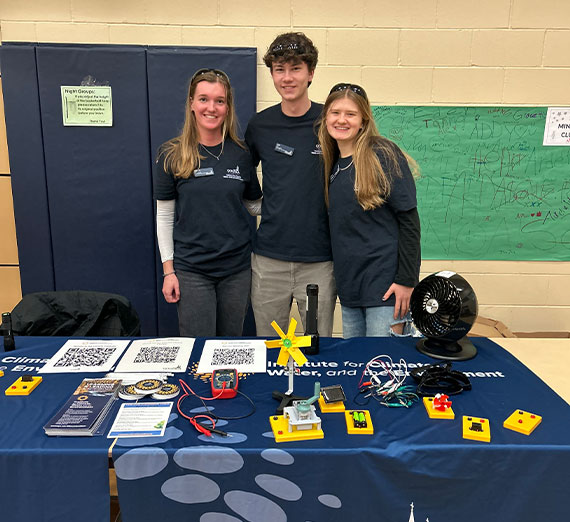Inspiring the Next Generation of Environmentalists

Gonzaga is making a difference in the greater Spokane community through the Climate Literacy Fellows, a group of students from Gonzaga’s Institute for Climate, Water, and the Environment who are passionate about environmental science and aim to teach future generations about the impacts of climate change in their local communities.
Holly Fijolek (’25), John Bergin (’25), Jordan Kremer (’25) and Leah Gulick (’27) are all Climate Literacy Fellows at Gonzaga. As part of their jobs, these students go in pairs to local K-8 classrooms to teach hands-on science lessons, with an emphasis on climate change.
"Our topics range from things like renewable energy and electric vehicles to food webs and invasive species,” says Fijolek, an environmental science major.
When they are not teaching in classrooms, the Fellows “are working on designing lessons, staffing Climate Institute lectures, or attending STEM nights [at local public schools],” says Gulick.
When asked their favorite aspects of being a Climate Literacy Fellow, all four Fellows said the best parts were the students and being in the classroom. There, they feel the impact of what they are doing for the community.
The Fellows shared that they see the value in education and want to ensure that the next generation knows that their choices have an impact, especially in their local communities.
Bergin, a sociology and environmental studies double major, emphasizes that “it's easy to stay in the Gonzaga bubble and never really interact with Spokane, but the Climate Institute allows me to get to diverse areas around Spokane, get to know the people through the schools, and hopefully help inspire students to be conscious and responsible members of their human and non-human communities.”
Kremer, also an environmental studies major, says the Climate Literacy Program, and specifically the Fellows program, is a unique approach to addressing the climate crisis as it incorporates a younger demographic as part of the solution
“Elementary-middle school aged students can be agents for change, whether that just means an expansion of their own worldviews or their influence on their families and peers,” says Kremer, who is the Climate Literacy Fellow mentor in addition to being a part of the program herself.
“By working directly in classrooms, a large portion of the Spokane community that is normally unaddressed in this way can become involved in community-solution making. I hope that by reaching this demographic we can not only inspire well-informed, community-driven individuals but also the people around them.”
Gonzaga recently received a $248,200 grant from the state that will help this program hire a new program coordinator, provide funding for program materials, and support classroom teachers through professional learning workshops. With this funding, the Climate Literacy Fellows aim to continue to educate students about the local impacts of climate change in ways that inspire hope and action.
For more information about the Institute’s Climate Literacy Project, visit http://www.gonzaga.edu/ClimateLiteracy.
